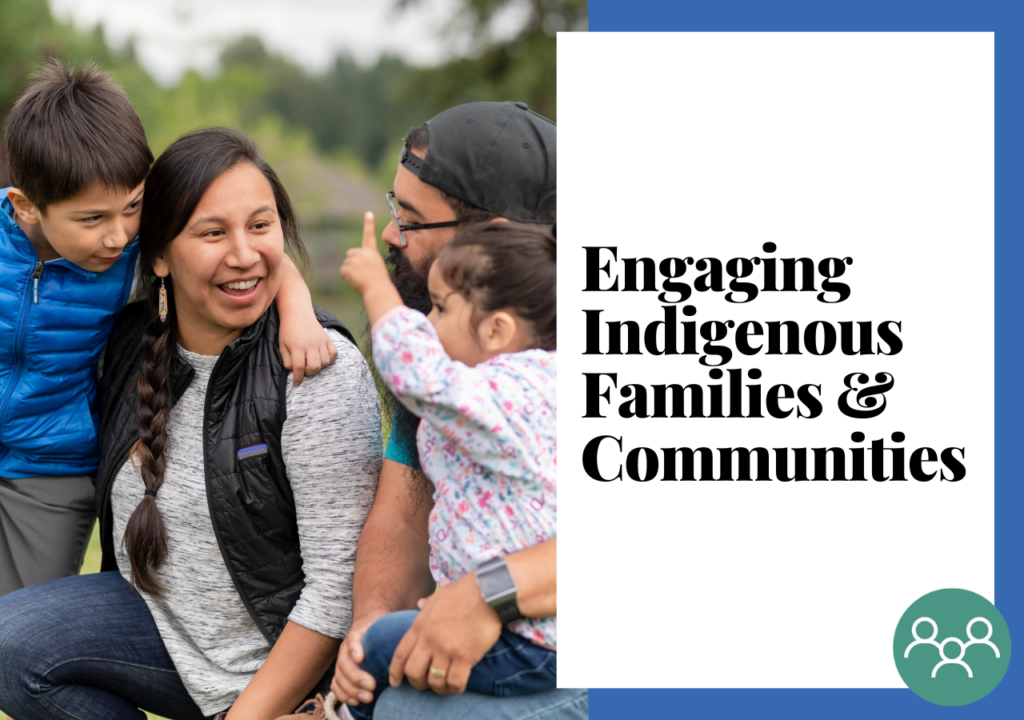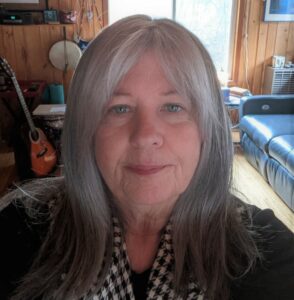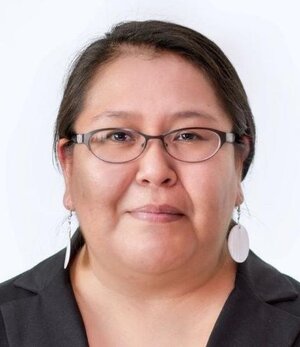Engaging Indigenous Families & Communities
This training was presented on
March 20 & 27, 2024

TRAINING MATERIALS & RESOURCES:
- Day 1
- Recording
- Presentation Slides (1/page)
- Presentation Slides (3/page)
- Discussion Question Worksheet
- Day 2
- Recording
- Presentation Slides (1/page)
- Presentation Slides (3/page)
- Discussion Question Worksheet
- Additional Resources:
- A Guide to Indigenous Land Acknowledgement
- Native Land Digital
- CalTrin Replay: Tribal Organization Outreach and Collaboration
- National Native Children’s Trauma Center
- Working Definition of Family-Driven Care
- California Indian Culture and Sovereignty Center’s California Indian Essential Understandings
- National Museum of American Indian’s Framework for Essential Understandings About American Indians
- Pathways to Partnerships with Youth and Families (NCTSN)
- Tribal Best Practices (NICWA)
- Family Driven Language (VT Federation of Families for Children’s Mental Health)
- Principles for Family Involvement (NFFCMH)
- Parent Engagement “Survey Says” Infographic (ACMH)
- White Bison: Culturally-Based Healing to Indigenous People
- National Federation of Families
Training certificates are only available following live trainings or completion of self-paced courses. A certificate will not be provided for review of these materials.
TRAINING DETAILS:
This two-part training is for service providers who are seeking to engage and build relationships with Indigenous families and communities. Through a framework of levels of relationship, participants will explore the concept of engagement as it pertains to tribal communities and examine how understanding of engagement may differ depending on the cultural context and level of collaboration. Participants will learn strategies to advance engagement with the indigenous families and communities with whom they work.
Learners will:
- Describe Indigenous cultural contexts and how they are distinct.
- Describe and understand the importance of tribal sovereignty and the 4 R’s in working with tribal communities.
- Define engagement within different cultural worldviews.
- Identify Indigenous family and community engagement strategies and how this differs from engaging tribal organizations.
- Assess current practice in engaging Indigenous families and communities.
- Explore tools and resources to aid in engagement.
Who should attend: Staff at the service provider level in family resource centers, Child Abuse Prevention Councils, community-based organizations, and other child and family systems who are seeking to engage and build relationships with Indigenous families and communities.
IMPORTANT TRAINING INFORMATION:
- This is an interactive training. Please be prepared to participate in activities such as group discussion, break out rooms, and/or demonstration. Your training experience will be best with the use of a web cam, audio, and a training environment conducive to active participation.
- This training will be recorded. The recording will be available to registered learners within 2 days of the training.
- By registering for a CalTrin training, you consent to be added to the CalTrin mailing list.
MEET THE SPEAKERS
Shannon CrossBear demonstrates and promotes gentle healing and expresses her commitment to healing through her work in the world. Her community and family history propelled her to leadership to address disparities that led to poor outcomes for friends and relatives. Shannon’s work has included facilitating and consulting with the National Indian Child Welfare Association, the Federation of Families for Children’s Mental Health, Georgetown University, the National Child Traumatic Stress Network, and the University of Montana’s National Native Child Trauma Center. She has provided technical assistance to Systems of Care and Circles of Care Initiatives in tribal and non-tribal communities, utilizing traditional interventions and promoting culturally congruent and trauma-informed practices. Shannon has worked in communities throughout the contiguous United States and Alaska, as well as Canada, to address systemic change for improved outcomes for children and their families. Ms. Crossbear has facilitated and supported practices and services that include the provision of culturally cemented early childhood, parenting programs, supports for transition age youth and young adults and families with mental health and substance abuse issues. Ms. CrossBear is skilled in trauma-informed community engagement and has supported organized stakeholder voice and representation through various local and national behavioral health initiatives.

SHANNON CROSSBEAR
Owner & Sr. Consultant/Trainer/Facilitator,
Strongheart Resource Development
Veronica Willeto DeCrane, MEd, is Diné (Navajo), of the Many Hogans Clan and born for the Mexican Clan. Her maternal grandfather is of the Tangle Clan, and her paternal grandfather is of the Bitter Water Clan. She was raised in Ojo Encino, New Mexico, on the Navajo reservation, and now lives in Billings, Montana with her husband and five children. Veronica has worked in Indian Education and Indigenous youth development in Montana for twelve years. At the University of Montana’s National Native Children’s Trauma Center (NNCTC), Veronica is a Training and Technical Assistance (TTA) Manager, providing trauma-informed care TTA for Tribal Youth Programs and Tribal Juvenile Healing to Wellness Courts in partnership with the Tribal Youth Resource Center. Veronica also offers TTA to schools and a variety of other tribal-child serving systems, facilitates the NNCTC’s Youth Advisory Council, supports the cultural adaptation of trauma-informed care resources, and serves on the National Child Traumatic Stress Network Steering Committee.

